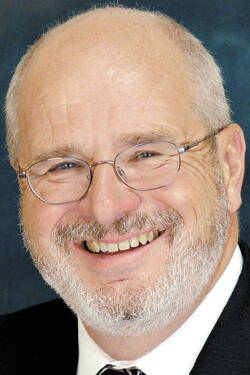So … the mug shot.
Former President Donald Trump’s studied glower as he submitted to being booked in Georgia’s Fulton County Jail has drawn much attention.
Some observers have noted that he used the photograph for fundraising purposes. That Trump hauled in more than $7 million serves as evidence either of his savvy at maneuvering through difficult situations or of the sheer crassness of his conman’s grift, depending upon one’s point of view.
Still others have noted the irony of the moment. The Trump-approved messaging below reproductions of his truculent scowl says “No Surrender” at precisely the moment he in fact is surrendering.
Both observations have validity, but they also miss a vital point.
As does Trump himself.
As I understand it, the former president’s strategy for dealing with his myriad legal troubles is to run again for this nation’s highest office, regain the White House and then either pardon himself or just have a compliant attorney general close the prosecutions.
There are problems with this strategy, even should it prove to be successful.
The first, of course, is that reclaiming the Oval Office won’t help Trump with the charges he faces in the states of New York and Georgia. Presidents cannot issue pardons for people convicted in state courts.
That means, even if he’s elected again, Trump will face continued peril in New York and Georgia.
That’s particularly true in Georgia.
The legal system there is designed to be resistant to political pressure. Governors do not have the authority to issue pardons. Only a special board does—and that board cannot do so until at least five years have passed from the date of conviction.
The former president faces as much as 20 years behind bars if he’s convicted on the racketeering charges he confronts. The minimum sentence is five years.
Trump is 77 now.
By the time the Georgia trial concludes, he’ll be nearly 78. If he must serve five years before he can be released or pardoned, he’ll be 83 when he gets out.
But let’s assume, for the moment, that the former president somehow figures out a way to make that problem go away.
If he does, then the plan to win reelection makes sense. It could eliminate any danger of federal prosecution for Trump.
But this would argue for the former president doing everything he can to be successful in the 2024 race, wouldn’t it?
Since 2016, when he eked out a win in the Electoral College with the help of former FBI Director James Comey and an aggressive Russian disinformation campaign, Trump still came up nearly 3 million ballots short in the popular vote.
Two years later, when he made the congressional elections a referendum on his presidency, Republicans ran 10 million votes behind Democrats in races for the U.S. House of Representatives.
In the 2020 presidential election, Trump lost both the Electoral College and popular votes—the latter by 7 million ballots.
Then in 2022, in what should have been a big year for Republicans, a slate of Trump-selected and Trump-backed candidates suffered defeat after defeat after defeat. This left the former president’s Republican Party in the minority in the U.S. Senate and with a majority in the House so small that it has made the chamber ungovernable.
Trump’s weak spot—his Achilles heel—in every campaign was the same.
America’s suburbs.
Before Trump, this country’s suburbs were GOP strongholds. They were the place Democrats’ dreams of campaign success went to die.
Suburban voters—particularly female suburban voters—have abandoned Trump and the Republican Party during the years of his dominance of the party. Even when they like some of his policies, such as tax cuts for the well-to-do, female voters in the communities surrounding America’s cities often are offended by Trump’s casual and constant misogyny and his ongoing crudities.
If Trump’s plan to stay free is to work, he needs those women to vote for him.
His petulant stare in the mug shot may make his most devoted followers jump with joy and empty their wallets, but does it help him with the suburban women voters he most needs to persuade?
Or does it remind them of a guy with whom they wouldn’t get into a car or share an elevator unless they had a friend with them?
Grimacing at undecided voters is a tactic only Donald Trump would try.
There’s a reason for that.
John Krull is director of Franklin College’s Pulliam School of Journalism and publisher of TheStatehouseFile.com, a news website powered by Franklin College journalism students. The views expressed are those of the author only and should not be attributed to Franklin College. Send comments to [email protected].




